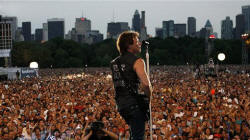 |
Other
News... sponsored by Richardson Repair & A-Plus Flooring |

 Concert industry posts record year despite economy
Concert industry posts record year despite economy
[December 23, 2008]
NASHVILLE, Tenn. (AP)
--
The concert business grossed just under $4 billion worldwide in 2008, the most ever for a year and up almost 13 percent over last year, according to Billboard magazine.
"Overall, it's been a pretty good year for touring," said Ray Waddell, who covers the industry for Billboard. "I'd never say it's recession-proof, but it's resilient."
|
In North America, the average box office gross was up 18 percent and the average attendance up 6.3 percent. Bon Jovi's tour was the year's highest-grossing, based on the trade publication's data from Nov. 14, 2007, to Nov. 11 of this year. It grossed $210.6 million and drew nearly 2.2 million fans. Bruce Springsteen was second ($204.5 million gross) followed by Madonna ($162 million). The most lucrative country tours were Kenny Chesney, sixth on the list with $86 million gross; and Rascal Flatts, 10th with $55.8 million. "It's not something you can get a fix for somewhere else," Waddell said of live music. "There's no other substitute for it, and compared to other things, it's pretty affordable." Fans keep coming. First-week sales for Britney Spears' 2009 tour were strong enough that extra dates were added, and AC/DC and Metallica have already sold out shows for January and February. Last month, concert promoter giant Live Nation reported third-quarter profit more than tripled to $139.9 million. But Waddell warned: "It would be crazy to think that the economy and unemployment won't impact ticket sales at some point." The squeeze may already be on in some places. In Nashville, promoters blamed slow ticket sales for canceling a New Year's Eve concert at the Sommet Center featuring Trace Adkins and Lynyrd Skynyrd. John Huie, vice president of Creative Artists Agency in Nashville, which sets tour schedules for Tim McGraw, Faith Hill, Keith Urban, Alan Jackson, ZZ Top and many others, said more fans are waiting until the day of the show to buy tickets because they're uncertain about the economy. Gary Bongiovanni, editor-in-chief of the concert industry publication Pollstar, noted that most of the tickets for shows in October, November and even December were sold in advance, before the latest round of bad economic news. The full effect won't be felt until next year, he predicted. "The problem will be if we're still in this economic environment when summer hits, when so many acts go on the road," Bongiovanni said. "Even in good times the public has a hard time supporting them all, and obviously when people are unemployed they're not going to be buying concert tickets." |

